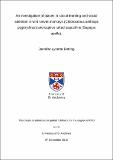Files in this item
An investigation of biases in social learning and social attention in wild vervet monkeys (Chlorocebus aethiops pygerythrus) and captive tufted capuchins (Sapajus apella)
Item metadata
| dc.contributor.advisor | Whiten, Andrew | |
| dc.contributor.author | Botting, Jennifer Lynette | |
| dc.coverage.spatial | xv, 151 p. | en_US |
| dc.date.accessioned | 2017-12-05T17:05:56Z | |
| dc.date.available | 2017-12-05T17:05:56Z | |
| dc.date.issued | 2017-06-20 | |
| dc.identifier.uri | https://hdl.handle.net/10023/12260 | |
| dc.description.abstract | Researchers in the field of social learning have suggested that certain biases may exist in whom animals learn from, creating a non-random flow of social information. A number of potential biases have been proposed based upon theoretical models, including biases to copy more dominant individuals or individuals who receive the best payoff from their behaviour, but empirical evidence for these biases is lacking. This thesis presents the first examination of dominance-based bias in a wild population of primates and of a payoff-based bias in captive capuchins. In two field experiments, dominant and low-ranking females from each of three wild groups of vervet monkeys (Chlorocebus aethiops pygerythrus) in KwaZulu-Natal, South Africa were trained to demonstrate contrasting behaviours to their group before observers were provided with a choice between the two modelled preferences. No evidence was found for a consistent bias to copy the behaviour of the dominant female in either experiment. Instead, in both experiments, a preference for one behaviour emerged, regardless of model rank. In the latter experiment, higher-ranking females were significantly more likely to match the dominant model’s action than were low-ranking females. The low-ranking models were more likely than their high-ranking counterparts to switch behaviours, despite their trained behaviour continuing to be productive. An analyses of the observations revealed that observers were biased towards attending to kin, and observer age appeared to influence access to the dominant models, but no overall preference to attend to the dominant female was found. Together these findings indicate that kinship, sex, age and preferences for specific behaviours are more important factors than model rank in vervet monkey social learning. Finally, I examined whether captive tufted capuchins (Sapajus apella) utilized a payoff-based social learning bias in their foraging decisions. Subjects did not utilize public information when choosing between demonstrated resource-rich and resource-poor sites, suggesting that the social learning abilities of capuchins may not extend to determining the profitability of feeding sites, although limitations of the study are discussed. | en_US |
| dc.description.sponsorship | Work supported by a grant from the John Templeton Foundation | en |
| dc.language.iso | en | en_US |
| dc.publisher | University of St Andrews | |
| dc.rights | Attribution-NonCommercial-NoDerivatives 4.0 International | * |
| dc.rights.uri | http://creativecommons.org/licenses/by-nc-nd/4.0/ | * |
| dc.subject | Vervet monkey | en_US |
| dc.subject | Capuchin | en_US |
| dc.subject | Social learning | en_US |
| dc.subject | Field experiment | en_US |
| dc.subject.lcc | QL737.P925B7 | |
| dc.subject.lcsh | Social learning | en |
| dc.subject.lcsh | Cercopithecus aethiops | en |
| dc.subject.lcsh | Capuchin monkeys--Psychology | en |
| dc.subject.lcsh | Social behavior in animals | en |
| dc.title | An investigation of biases in social learning and social attention in wild vervet monkeys (Chlorocebus aethiops pygerythrus) and captive tufted capuchins (Sapajus apella) | en_US |
| dc.type | Thesis | en_US |
| dc.contributor.sponsor | Templeton Foundation | en_US |
| dc.type.qualificationlevel | Doctoral | en_US |
| dc.type.qualificationname | PhD Doctor of Philosophy | en_US |
| dc.publisher.institution | The University of St Andrews | en_US |
The following licence files are associated with this item:
This item appears in the following Collection(s)
Except where otherwise noted within the work, this item's licence for re-use is described as Attribution-NonCommercial-NoDerivatives 4.0 International
Items in the St Andrews Research Repository are protected by copyright, with all rights reserved, unless otherwise indicated.


